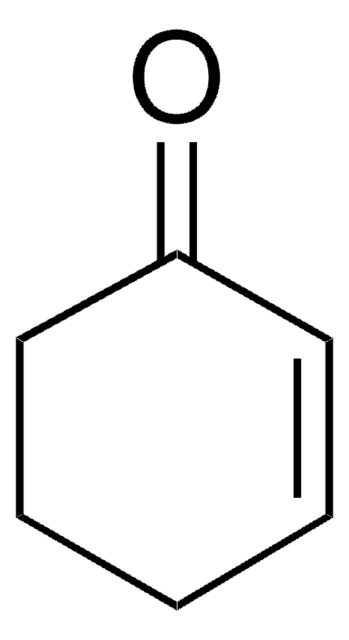W390909
Cyclohexanone
99.8%
Synonym(s):
Hexanon, Keto hexamethylene, Ketohexamethylene, Pimelic ketone, Sextone
About This Item
Recommended Products
biological source
synthetic
Quality Level
Agency
meets purity specifications of JECFA
vapor density
3.4 (vs air)
vapor pressure
3.4 mmHg ( 20 °C)
Assay
99.8%
form
liquid
autoignition temp.
788 °F
expl. lim.
1.1 %, 100 °F
9.4 %
refractive index
n20/D 1.450 (lit.)
bp
155 °C (lit.)
mp
−47 °C (lit.)
density
0.947 g/mL at 25 °C (lit.)
application(s)
flavors and fragrances
Documentation
see Safety & Documentation for available documents
food allergen
no known allergens
Organoleptic
minty
SMILES string
O=C1CCCCC1
InChI
1S/C6H10O/c7-6-4-2-1-3-5-6/h1-5H2
InChI key
JHIVVAPYMSGYDF-UHFFFAOYSA-N
Looking for similar products? Visit Product Comparison Guide
General description
Application
- Structural Revision of Hyperibrin B and Hyperscabrones H and I by Biosynthetic Considerations, NMR Analysis, and Chemical Synthesis.: Cyclohexanone is utilized in the synthesis and structural revision of complex natural products, demonstrating its utility in biochemical research (Wang et al., 2021).
- Biocatalytic conversion of cycloalkanes to lactones using an in-vivo cascade in Pseudomonas taiwanensis VLB120.: This study highlights the biocatalytic potential of Cyclohexanone in producing valuable lactones, contributing to advancements in green chemistry (Karande et al., 2018).
Disclaimer
Signal Word
Danger
Hazard Statements
Precautionary Statements
Hazard Classifications
Acute Tox. 4 Dermal - Acute Tox. 4 Inhalation - Acute Tox. 4 Oral - Eye Dam. 1 - Flam. Liq. 3 - Skin Irrit. 2 - STOT SE 3
Target Organs
Respiratory system
Storage Class Code
3 - Flammable liquids
WGK
WGK 1
Flash Point(F)
111.2 °F - closed cup
Flash Point(C)
44 °C - closed cup
Personal Protective Equipment
Choose from one of the most recent versions:
Already Own This Product?
Find documentation for the products that you have recently purchased in the Document Library.
Customers Also Viewed
Our team of scientists has experience in all areas of research including Life Science, Material Science, Chemical Synthesis, Chromatography, Analytical and many others.
Contact Technical Service















